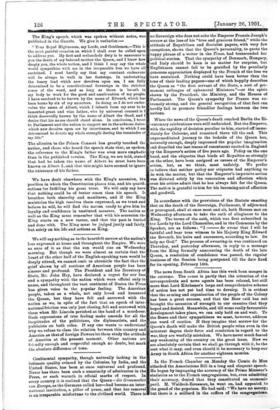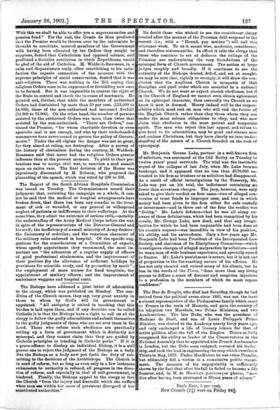• In the French Chamber on Monday the Comte de
Men• attacked the Associations Bill in a long and eloquent speech. He began by impugning the accuracy of the Prime Minister's statistics as to the French congregations, but, even admitting their accuracy, denied that they constituted an economic peril. M. Waldeck-Rousseau, he went on, had appealed to the greed of the populace. He had said: "We have no money; but there is a milliard in the coffers of the congregations. With this we shall be able to offer you a superannuation and pension fund." For the reefs the Comte de Man predicted that the Premier would be thrown over by the extremists he thought to conciliate, taunted members of the Government with having been educated by the Orders they sought to suppress, denied that Catholicism had opposed science, and predicted a Socialist revolution in which Republicans would be glad of the aid of Catholics. M. Waldeck-Rousseau, in a calm and dispassionate reply, after establishing to his satis- faction the organic connection of the measure with the supreme principles of social conservation, denied that it was anti-religious. There was nothing in the Bill saying that religious Orders were to be suppressed or forbidding new ones to be formed. But it was impossible to contest the right of the State to control and check the increase of mortmain. He pointed out, further, that while the members of authorised Orders had diminished by more than 50 per cent. (113,000 to 54,000), those of the non-authorised had increased fivefold (14,000 to 75,000). On the other hand, the number of persons assisted by the authorised Orders was more than twice that assisted by the non-authorised. "There are Orders," con- tinued the Premier, "for whom charitable devotion or even apostolic zeal is not enough, and who by their underhanded manceuvres have never ceased to govern the policy of Govern- ments." Under the old r4gime the danger was not so great, for they aimed at ruling, not destroying. After a survey of the history of clericalism during the century, M. Waldeck- Rousseau said that never had the religious Orders greater influence than at the present moment. To yield to their pre- tensions was to accept civil war, to sanction a mad assault upon an entire race. The final decision of the House was ingeniously discounted by M. Brisson, who proposed the placarding of the speech, which was voted by 298 to 226.



















































 Previous page
Previous page